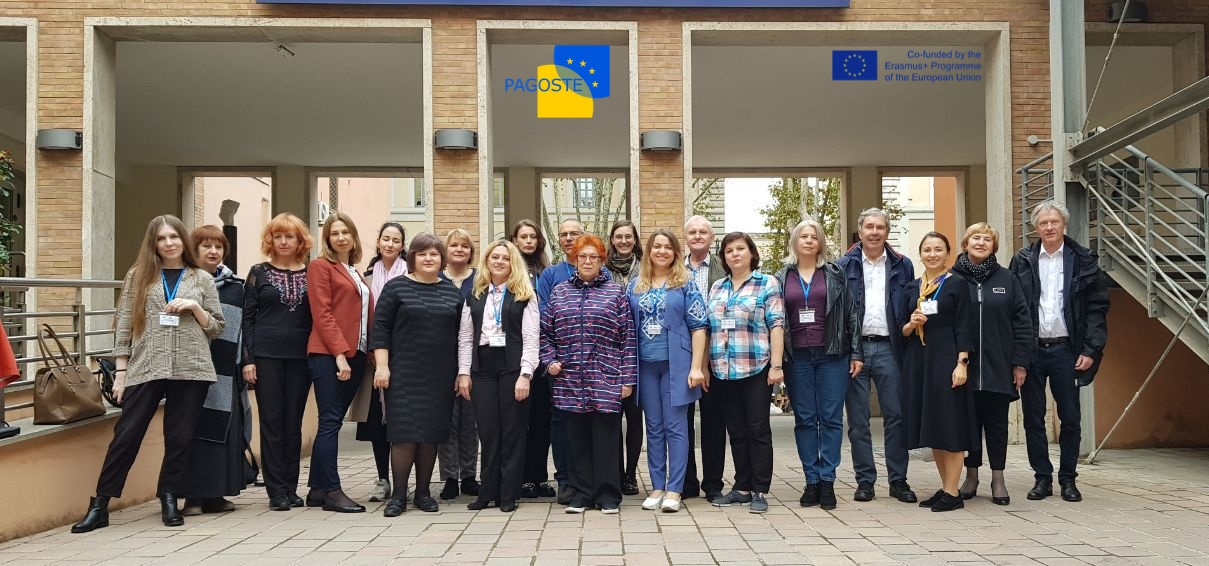
Information on the Erasmus+ project PAGOSTE and on its project events
The war of russia against Ukraine, the occupation of part of the Ukrainian territory, the introduction of martial law, the destruction of infrastructure, the lack of communication, constant air strikes, threats of bombing and shelling, and evacuation of a large part of the population caused chaos in the country. The Erasmus+ project PAGOSTE “New mechanisms of partnership-based governance and standardization of vocational teacher education in Ukraine“ (Nr. 609536-EPP-1-2019-1-DE-EPPKA2-CBHE-SP) that is since 2020 coordinated by the Chair of Economics and Business Education I of the University of Konstanz was as well badly affected by the war: the shutdown of educational and scientific institutions, and some government institutions made it impossible to perform project tasks, implement travel activities and sometimes communicate between project participants. Despite the new challenges faced by the project team, it was decided to continue working on implementing governance mechanisms for the training of vocational education teachers based on the partnership at the institutional and national levels. As a solution to such a challenging situation the project combined presence and online activities.
The war of russia against Ukraine, the occupation of part of the Ukrainian territory, the introduction of martial law, the destruction of infrastructure, the lack of communication, constant air strikes, threats of bombing and shelling, and evacuation of a large part of the population caused chaos in the country. The Erasmus+ project PAGOSTE “New mechanisms of partnership-based governance and standardization of vocational teacher education in Ukraine“ (Nr. 609536-EPP-1-2019-1-DE-EPPKA2-CBHE-SP) that is since 2020 coordinated by the Chair of Economics and Business Education I of the University of Konstanz was as well badly affected by the war: the shutdown of educational and scientific institutions, and some government institutions made it impossible to perform project tasks, implement travel activities and sometimes communicate between project participants.
Despite the new challenges faced by the project team, it was decided to continue working on implementing governance mechanisms for the training of vocational education teachers based on the partnership at the institutional and national levels. As a solution to such a challenging situation the project combined presence and online activities.
On October 17-19, 2022, the project team of the University of Konstanz together with the project team of the Vienna Economics University organized an online staff training for university academic staff and vocational teachers in Ukraine. The topic of the training was dedicated to teacher professionalisation: approaches, structure and standards. Prof. Dr. Thomas Deissinger made an overview of the role of vocational schools and teachers in vocational teacher training in Germany and Oksana Melnyk analysed the standards and governance of vocational teacher training in Germany on the normative level. Prof. Dr. Oliver Greuling from the state Seminar of vocational training of Weingarten who was an invited speaker and Joachim Dietrich a lecturer of didactical courses explained the importance of in-service teacher professionalization courses from a very practical perspective of lecturers at vocational schools. Prof. Dr. Richard Fortmüller from the Vienna University of Economics and Business provided an overview of professional competences of vocational teachers in Austria. Over 250 participants from all regions of Ukraine participated in the three-day event. The participants expressed a big interest in future events on such topics.
On November 2-5, 2022, the fourth workshop of the Erasmus+ project “New mechanisms of partnership-based governance and standardization of vocational teacher education in Ukraine (PAGOSTE)” took place at the Roma Tre University (Rome, Italy). The main objectives of the workshop were to discuss the current state of implementation of structures for partnership-based governance at every partner-university and to analyze its work progress on the national level. Totally twenty two project members from four countries (Germany, Italy, Austria and Ukraine) participated in the project workshop. Apart from working on the objectives, the participants had an opportunity to visit a vocational school Domizia Lucilla and learn the practical experience of learning settings of the Italian vocational education system. On the example of this vocational school, the project members were shown how theory and practice are combined in school-based vocational education and with which professional associations and institutions the Italian vocational schools cooperate for enhancing the practical part of the training. The project workshop proved to be very fruitful in developing new original ideas for establishing better cooperation mechanisms in the current governance system of vocational teacher training in Ukraine and in promoting the team spirit in the project consortium.
Despite the challenges of the war conditions, the Ukrainian partner-university managed successfully to conduct a selection procedure and send students to the University of Konstanz for a study visit of students. Eight Ukrainian students from four partner universities visited the University of Konstanz from 13.11.22 to 26.11.22. The main goal of the study visit was to introduce the students who study at the bachelor and master vocational teacher training programmes in Ukraine to the practical experience of the University of Konstanz in the implementation of effective cooperation and partnership in vocational teacher training that concerns teaching and research. The training programme of the study visit included three elements. The first element was systematic input events organised by the project team with different lecturers of the University, the study advisor of the Department of Economics and the International Office, the student work group and representatives of the Binational School of Economics (BISE). The second element of the training strategy was the attendance of lectures and seminars according to the interest of the students. The final element of the study visit was the work on the recommendation for improving vocational teacher training in Ukraine, which the students developed based on the first two elements of the training strategy. The students provided very positive feedback on the study visit and underlined the enriching experience of the study process at the University of Konstanz and the many inspirational impulses and ideas they received during their stay at the University.
- Oksana Melnyk
